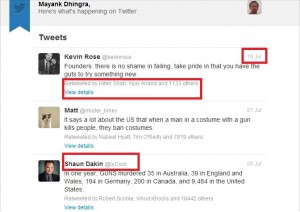I like many of you, am an internet junkie i.e I spend more waking hours of my day on it than off. I started using Twitter in 2007, a few months after it’s launch and have happened to stuck with it for FIVE long years with steady unswerving loyalty. Not just this, thanks to the tweetdeck (a twitter client) I have it open on my system all the time. Among other things Tweetdeck allows me to manage multiple accounts(my personal acc @mayankdhingra and the @dialabook account), track keywords/hashtags among other things.
So via these 2 accounts I follow close to 2,000 people and have access to at least 3 keywords which I track. As you can imagine, it makes for enormous amount of data in my TL’s (Twitter Timelines) and as expected it gets overwhelming at times. But, that’s not the worst part for me. The worst part is that I like some other information/content junkie can’t have enough of sites/blogposts/news etc and thus I feel bad about not being able to fish out interesting/useful content from my timeline.
Yesterday after coming back home at 3:30 AM or so when I logged on twitter and tried to skim the TL, I found this interesting(thought not much useful yet) website for tracking multiple couriers, given my business it will come in quite handy. Similarly while checking TL of someone I found this gem for indian indie music.
Think about it, if I weren’t to go and proactively check out past tweets, I wouldn’t have been able to find these, not in the near future at least and this is what pains me.
Discovery(content or otherwise) can happen in two ways
- Planned (Organized/Structured)
- Accidental (Random)
If I log onto a particular blog/site everyday for news it is a planned way to discover content (applicable offline too), if I have subscribed to a newsletter it’s planned discovery. However, if someone whom I follow on twitter, RT’s an interesting link and I am online and it appears in my TL it is accidental or random. The major reason I have stuck on twitter despite all the weird ADSD people and their antics is Content and Twitter is by far the best place to get the content dope.
While we all try our best to plan to get the content we’d like to read, it’s the accidental discovery that interests me more. Though by nature this is random and in a way that’s it’s beauty. Out of nowhere you get something that could have an impact. For sake of perspective
- Scope for Planned Discovery:
Source : 1- 100 (upper limit) blogs/sites
Average Posts/Day on these sources: 5-20(upper limit)
Total posts/stories accessible: 2,000 - Scope for Unplanned Discovery:
Number of people I follow(from my personal account): 500 or so
Number of people they follow: 300 or so
Number of weblinks that a person shares in a day: 5
Total posts/stories accessible: 500*300*5 = 75,00,00
Depending on my usage(or active usage) of Twitter, I discover less than 0.01% of all content available (Think of the stuff I am missing while I type this sentence)
However, like in other aspects of life I want to be able to control this discovery and try to bring some method to the madness. I mean, why should I miss really interesting stuff just because I wasn’t scanning my TL and writing this blogpost when somebody tweeted it or how can I increase my chances of finding out stuff about my areas of interest? This is precisely the Twitter’s Discovery Problem I am talking about. It’s like a river stream in which I can swim anytime and come out anytime, but what happens when I am not swimming or even when I am there.
How does the relevant content find you and not the other way around?
One of the ideas which a Tarun had was to have an app that rates various links being shared in one’s Timeline based on the number of RT’s it got, so that we get to see what’s popular (weblinks) in our TL’s. Interestingly, before he could find time to built the app, twitter started doing this themselves in their daily newsletters
The problem is twin fold
- How to get access to a bigger source of content
- How to filter the content for quality and personal preferences
Some top of the head ideas
- Further simplify the process of sharing content both on and off twitter. I see a post on iPhone app design and I know 5 people in my network would love it but how to share this with them? (Think email, think tagging,
think hashtagging etc) - Sticky tweets: I find something interesting and want most people who read my tweets to be able to see it not just when I tweeted but also for the entire day. How about having that tweet appear on top of my TL and not get hidden in my stream. Sometweets could also appear differently visually/design wise
- A hashtag discovery engine: There are tonnes of hashtags people create daily, a smaller subset of this happens in our timelines too. What if people were to use hashtags more and then there’s a page which has a hashtag cloud. The most popular hashtags appear BIGGER AND BOLDERwhile less popular ones not so. That’s a brand new way to discover content based on how people in my network(or otherwise) tag it.PS: No, this is not the same as twitter trends you genius.
- Favorite Tweets: This is undeniably one of the most underused and undervalued feature of twitter, what if we could also share stuff people favourite more prominently? If 50 people in my TL have favourited I might as well would want to check it out
These are just some of the ideas I could think of while writing this blog post but I am sure there’s a lot of value that can be unlocked here.
You could have just missed this post, had it not been for accidental/random discovery. Think about it…


